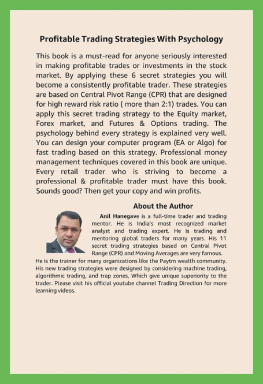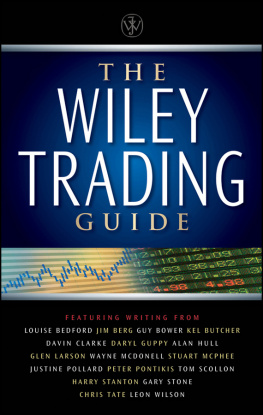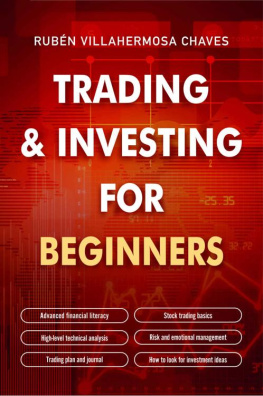IntroBooks - Day Trading
Here you can read online IntroBooks - Day Trading full text of the book (entire story) in english for free. Download pdf and epub, get meaning, cover and reviews about this ebook. year: 2017, publisher: IntroBooks, genre: Business. Description of the work, (preface) as well as reviews are available. Best literature library LitArk.com created for fans of good reading and offers a wide selection of genres:
Romance novel
Science fiction
Adventure
Detective
Science
History
Home and family
Prose
Art
Politics
Computer
Non-fiction
Religion
Business
Children
Humor
Choose a favorite category and find really read worthwhile books. Enjoy immersion in the world of imagination, feel the emotions of the characters or learn something new for yourself, make an fascinating discovery.
- Book:Day Trading
- Author:
- Publisher:IntroBooks
- Genre:
- Year:2017
- Rating:4 / 5
- Favourites:Add to favourites
- Your mark:
- 80
- 1
- 2
- 3
- 4
- 5
Day Trading: summary, description and annotation
We offer to read an annotation, description, summary or preface (depends on what the author of the book "Day Trading" wrote himself). If you haven't found the necessary information about the book — write in the comments, we will try to find it.
Day Trading — read online for free the complete book (whole text) full work
Below is the text of the book, divided by pages. System saving the place of the last page read, allows you to conveniently read the book "Day Trading" online for free, without having to search again every time where you left off. Put a bookmark, and you can go to the page where you finished reading at any time.
Font size:
Interval:
Bookmark:

Day Trading
IntroBooks #291
readintrobooks.com
Copyright 2016 IntroBooks
All rights reserved.
Financial securities, financial commodities and other such fungible items are traded in financial market. Transaction costs are comparatively low in such market. Moreover, prices of these items reflect their supply and demand as well. In financial securities, items such as stock and bonds are usually included. On the other hand, precious metals or agricultural products are part of financial commodities.
Economics however, defines market as aggregate of sellers and potential buyers of a specific item or certain service and transaction that takes place between buyer and seller. It means there are three main components to form a complete market body. Those are sellers of the item or service, buyer of the item or service and transaction that take place between these two parties. Such transactions usually involve exchange of a particular item in return of money, or other item / wealth. However, sometimes term market is used strictly to refer exchanges or organizations that work in order to facilitate trading of financial securities or financial commodities. Various stock exchanges and commodity exchanges are great examples of such organizations. These organizations can either be physical or electronic systems. Examples of physical locations are NYSE, BSE and NSE. They can also be electronic systems without any physical existence and NASDAQ is the greatest available example for demonstrating such system. Most of the trading related to stocks and bonds usually take place at exchange. However, corporate actions such as merger and spinoff take place outside or without a stock exchange. Moreover, if one company decided to sell their stock to other one with their agreement, there will be no requirement for stock exchange in such initial transaction.
Most trading of currencies and bonds are usually based on bilaterally. There are still many people who prefer to use stock exchanges as medium for trading, buying and selling stocks. On the other hand, there are also some people developing electronic systems that serve the same purpose as a physically existing stock exchange does.
Day trading is an important concept or say component of stock exchange and trading. In upcoming chapters, various aspects related to this concept will be covered with deep details.
Speculation in financial securities is referred as day trading. This concept is usually referred to when trading of financial instruments such as their buying and selling takes place in a single trading day. In a simple manner, day trading is trading of financial securities or instruments within a single trading day. It is done in such a way that all related positions should be closed before the market or related stock exchange closes that particular trading day. However, not every trader is strict enough to follow this strategy or concept with pin point accuracy. Still, there are a significant numbers of traders involved in stock trading who follow or implement concept of day trading in their operation as their overall strategy. Their rule is simple, nothing works? Lets apply day trading.
Such traders, taking part in day trading are referred as Day Traders. There are some traders who take part in day trading and trade-in such capacity with aim of getting out some profit through it are referred as speculators. In day trading main activity is to trade various financial instruments. Following are some most common financial instruments traded in day trading. They are also referred as Day traded financial instruments:
Stocks
Options
Currencies
Host of future contracts
Equity index futures
Interest rate futures
Currency futures
Commodity futures
Back into the time, day trading was nearly exclusive activity mostly done by well established financial firms and professional speculators as well. Most of the day traders are employees of various banks or investment firms. These employees are assigned as specialists for managing funds and equity investment. Nowadays, it is not an exclusive activity that is performed by limited parties as done in the past. Technologies such as electronic trading and concept of margin trading have encouraged this activity to become more common and it can / is done by almost any common trader nowadays.
Scalping is an intraday technique used by some day traders. In this technique, traders usually hold a particular position for a few minutes only. Sometime this time span is even of seconds only. Positions are left by most of the day traders just before the market closes. Doing this, traders avoid the damage of unmanageable risks. These risks are usually the negative gaps between price at current days closing and the price at next days opening. However, these gaps sometime are positive too. That is why some day traders prefer to stay in a particular position even after the market closes. Such day traders believe that they can keep the profit running by doing so.
As described before, margin trading is an important concept that helped in the process of making Day trading common for every trader. In day trading, when day trader borrows money from other party to invest in trading, it is known as margin trading. In such trading, the traders require to pay no or nearly zero fees for margin benefits. It is because margin interests would be usually charged on overnight balances since the money is borrowed for a single day only and most commonly returned by the next day. Still, trading is the second name of risk. There is no market without risk. Just like that, margin trading too is not completely safe. There is always a risk of margin call. Margin interest rates are part of such margin trading. These rates are usually based on brokers call. There is rarely an exception.
Profit and Risks:
Day trading results have a wide range starting from extremely high returns and extremely high loss. Financial leverage behavior and possible rapid returns are reasons behind such instability. There are several possibilities involved in such trade. High risk day traders are likely to end up either with huge returns or loss; the result can be anything in between these two boundaries. Since possibilities of high profits and losses are involved in day trading, other investors refer to day traders as gamblers or bandits.
Risk involved in day trading is even higher if any of following aspects is present while trading is taking place:
When trying to trade a losers game or system instead of attempting on at least a winnable system or game
When capital risk is inadequate with excess stress of having some to survive in upcoming trading
If traders are executed poorly (poor guy would be even poorer)
If money management is not done competently
Gains and losses are amplified by the common use of buying on margin (as explained before, funds are borrowed for trading in margin trading). In such trading, loss or profit can occur within a comparatively short period of time in a substantial amount. Moreover, to take maximum possible advantage of such day traders they are allowed with bigger margins by most of the brokers since interest rates are based on brokers call.
Let us explain this term with a quick example. In USA, in order to hold a stock position overnights, margins are required to be at least 50% of value of the stock. Despite that, pattern day traders are allowed by most of the brokers to keep these rates as low as 25% for inter day purchases only. This ultimately means that a day trader who legally has 25000 USD in his account will be allowed to purchase stocks worth 100000 USD as long as he leaves half of these positions before the trading day is closed by the market.
Font size:
Interval:
Bookmark:
Similar books «Day Trading»
Look at similar books to Day Trading. We have selected literature similar in name and meaning in the hope of providing readers with more options to find new, interesting, not yet read works.
Discussion, reviews of the book Day Trading and just readers' own opinions. Leave your comments, write what you think about the work, its meaning or the main characters. Specify what exactly you liked and what you didn't like, and why you think so.
















